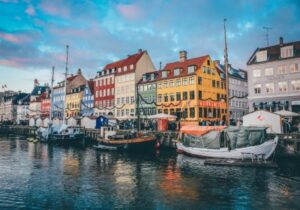Corruption, defined as dishonest or fraudulent conduct by those in power, can hinder a country and its citizens’ economic and social progress so it’s essential to limit corrupt culture as much as possible. The least corrupt countries stand out for maintaining transparency, strong governmental institutions, and governance that is ethical.
In this article, we explore the 10 least corrupt countries in the world, based on the latest Corruption Perceptions Index (CPI) data, and examine why these nations are considered global models for transparency, safety, and good governance. Whether you’re researching safe countries to live in, invest in, or retire to, this least corrupt countries ranking can serve as a reliable guide.
How is the Corruption Perceptions Index (CPI) score determined?
Public NGO Transparency International’s Corruption Perceptions Index (CPI) is compiled by monitoring and reporting on corruption worldwide.
The CPI measures perceived levels of public sector corruption across 180 countries, using data from institutions like the World Bank, World Economic Forum, and private risk consultancies.
Each country receives a score from 0 to 100 with 0 being highly corrupt and 100 is very clean. The CPI is updated annually, making it one of the most widely used tools to compare corruption levels worldwide.
Countries like Denmark, Finland, and New Zealand tend to lead the global rankings. These nations consistently score high for clean public sectors, effective anti-corruption laws, and trust in government.
Top 10 Least Corrupt Countries in the World
1. Denmark
Corruption Perception Index Score: 90

The Danish government enforces strict anti-corruption laws that apply across all levels, from civil servants to political leaders. A zero-tolerance policy toward bribery and misuse of public office reinforces public trust.
While Denmark briefly slipped in past rankings due to isolated scandals, it has since reaffirmed its leadership in global integrity. Its continued focus on ethics and civic participation keeps it at the top of the least corrupt countries ranking.
2. Finland
Corruption Perception Index Score: 88

The Finnish legal system applies anti-corruption measures consistently, and the country scores high in public trust. While no nation is entirely immune to corruption, Finland’s long-standing policies help ensure accountability and fairness across sectors.
This high CPI ranking reflects Finland’s commitment to ethical governance and its position as a trusted global leader in clean public administration.
3. Singapore
Corruption Perception Index Score: 84

The city-state’s public service is based on merit and integrity, with tight oversight over public contracts and government officials. These practices have made Singapore a model for clean governance in the region.
Although small in size, Singapore’s influence is outsized due to its strong institutions and emphasis on transparency.
4. New Zealand
Corruption Perception Index Score: 83

Despite this drop, it’s still very high on the list and is a country known for still having one of the most highly transparent governments and low levels of public sector corruption.
Robust anti-money laundering laws, independent courts, and accessible public records contribute to its high score. New Zealand also encourages civic engagement and media freedom, further reducing corruption risks.
While minor concerns have emerged over lobbying and influence, the country’s strong legal procedures continue to uphold its international reputation.
5. Luxembourg
Corruption Perception Index Score: 81

Luxembourg’s anti-corruption efforts are reinforced by independent oversight bodies and strict codes of conduct for officials. Open government practices and public participation contribute to the country’s high levels of trust.
Despite being the smallest country in Europe, Luxembourg’s strong institutions keep it securely within the top global rankings for integrity and transparency.
6. Norway
Corruption Perception Index Score: 81

The country’s strong legal and institutional structures play a crucial role in maintaining low corruption levels. Norway’s public administration is known for its efficiency, accountability, and strict adherence to ethical standards
The judicial system is independent and effectively enforces anti-corruption laws, ensuring that corruption cases are prosecuted without bias.
Additionally, Norway’s free press and active civil society contribute to its high CPI ranking by holding government officials accountable and fostering a culture of openness. The Norwegian government also prioritizes transparency in public spending and procurement processes, further minimizing opportunities for corruption.
7. Switzerland
Corruption Perception Index Score: 81

The country’s clean public sector is built on a foundation of rigorous anti-bribery legislation, institutional independence, and a high level of government transparency.
Switzerland’s legal system criminalizes both the offering and acceptance of bribes, and public officials are held to clear ethical standards.
While the presence of international organizations like the controversial FIFA has occasionally drawn scrutiny, Switzerland’s domestic governance remains largely free of systemic corruption.
The country’s decentralized political structure, independent judiciary, and active civil society all contribute to its robust anti-corruption system. Transparency in public procurement and access to public information further strengthen public trust and help solidify Switzerland’s place.
8. Sweden
Corruption Perception Index Score: 80

The Swedish government maintains a proactive stance on anti-corruption through dedicated oversight bodies and a legal system that enforces integrity at all levels of public service. Although occasional corporate misconduct has been reported, the public sector remains notably clean.
Freedom of the press, strong civic participation, and open access to government data reinforce Sweden’s accountability. These efforts ensure that Sweden stays near the top of the least corrupt countries ranking, upholding its long-standing tradition of clean and effective governance.
9. The Netherlands
Corruption Perception Index Score: 78

Not only is it known for being one of the best places for expats to live but it also ranks ninth on the CPI. The Dutch public sector is known for transparency, efficient regulation, and low tolerance for misconduct, hence the great score.
The country’s anti-corruption framework includes strict laws, an independent judiciary, and oversight agencies that monitor compliance. Ethical standards are reinforced through regular training for civil servants and institutional transparency.
A free press and engaged civil society further strengthen the Netherlands’ defenses against corruption. Public procurement processes are competitive and open, minimizing the risk of favoritism or fraud. These systems continue to position the Netherlands as a reliable and accountable democracy.
10. Australia
Corruption Perception Index Score: 77

The country enforces comprehensive anti-corruption legislation, with the National Anti-Corruption Commission (NACC), established in 2023, playing a key role in investigating public sector misconduct. Australia’s judiciary is independent, and government operations are subject to transparent oversight.
A free press, active civil society, and whistleblower protections contribute to public accountability. While concerns have been raised in recent years around political lobbying, recent reforms have strengthened institutional integrity. These changes reaffirm Australia’s position in the top ten, highlighting its ongoing commitment to clean governance.
Frequently Asked Questions about the Least Corrupt Countries
What are the most and least corrupt countries in the world?
Countries such as Denmark, Finland, New Zealand, Norway, Singapore, and Sweden are widely regarded as the least corrupt globally, consistently earning top marks for financial transparency. In contrast, countries like Syria, South Sudan, and Venezuela, along with Somalia, are considered among the most corrupt countries.
How is corruption measured in a country?
Corruption is most commonly measured by the Corruption Perceptions Index (CPI), which evaluates public sector corruption based on expert assessments and business surveys.
Which countries in Africa have the lowest corruption levels?
According to CPI rankings, the least corrupt African countries are Seychelles, Botswana, Cape Verde, Rwanda, and Mauritius.
Why are Scandinavian countries considered the least corrupt?
Scandinavian countries rank highly due to transparent governance, strong institutions, civic engagement, and a cultural emphasis on equality and accountability.
How does low corruption benefit a country?
Low corruption levels contribute to stronger institutions, more foreign investment, better public services, and higher citizen trust.
Which countries have zero corruption?
No country has zero corruption, but nations like Denmark, Finland, and Singapore come close, consistently scoring above 80 on the CPI.
Can corruption rankings change over time?
Yes, CPI rankings can shift due to changes in governance, reforms, public scandals, or improvements in transparency and accountability.
How do anti-corruption laws work in top-ranked countries?
In the least corrupt countries, anti-corruption laws are strictly enforced through independent institutions, such as anti-corruption commissions, public prosecutors, and audit agencies. These countries typically have:
- Transparent procurement and budgeting processes
- Legal penalties for bribery, fraud, and abuse of office
- Strong whistleblower protections
- Merit-based civil service systems
What are the most corrupt countries in the world?
According to the Corruption Perceptions Index, the most corrupt countries are those scoring the lowest on the CPI scale. These include:
- Somalia (score: 11)
- Venezuela (score: 13)
- Syria (score: 13)
- South Sudan (score: 13)
These countries typically suffer from armed conflict, authoritarian rule, weak rule of law, and little to no institutional oversight.
How can countries reduce corruption?
Countries can reduce corruption by:
- Enacting and enforcing strong anti-corruption laws
- Ensuring judicial independence and prosecutorial integrity
- Increasing transparency in public spending and procurement
- Supporting investigative journalism and civil society
- Protecting whistleblowers and promoting civic education
The most successful countries combine legal reforms with a culture of accountability and trust in public institutions.
Is the US considered a corrupt country?
The United States is not among the most corrupt nations but also no longer ranks among the top 25 least corrupt countries. While it maintains strong institutions, concerns remain about political lobbying, campaign financing, and lack of federal-level ethics enforcement, which can affect its global ranking.



